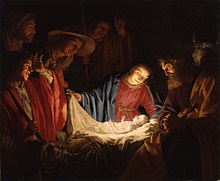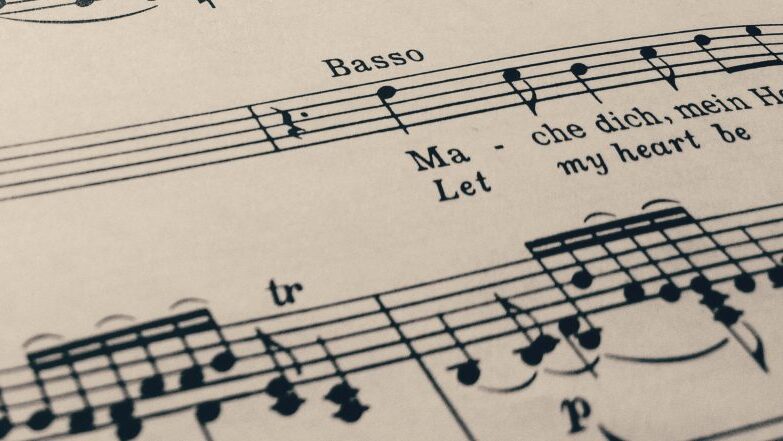

When does Christmas start? The shops stock Christmas in September; The Christmas adverts start in October; The radio plays songs from November; The decorations are up in December.
In the Church, Christmas truly begins with the Mass on Christmas Day. The preceding weeks make up the season of Advent—a time not of celebration, but of anticipation, as Christians prepare for the coming of Jesus. Advent is marked by an expectant waiting, a period of reflection and hope rather than immediate joy. While much of the music heard commercially in December is bright and jubilant, the music in Church during Advent carries a quieter, more contemplative tone, capturing the spirit of longing and preparation.

Christmas itself marks the arrival of the world’s saviour, yet the manner of Jesus’s arrival is deeply humble; he comes as a “little, weak, and helpless” child, as the carol Once in Royal David’s City so poignantly describes. This contrast between anticipation and fulfilment, and between grandeur and humility, defines the Church’s approach to the season, inviting believers to prepare their hearts for the profound mystery of the Incarnation.
It is little surprise, then, that the sacred music of Advent is among the most cherished in the choral repertoire. Composers have poured their hearts into creating pieces that capture both the reflective and, at times, jubilant spirit of this season. The 20th century saw a renewed interest in sacred music, and many composers were inspired to contribute works that have since become lasting treasures of the choral canon. These compositions resonate with the themes of hope and anticipation that define Advent, offering congregations and audiences a deep sense of spiritual preparation and beauty as Christmas approaches.

Ralph Vaughan Williams (1872–1958) was deeply captivated by the folk music tradition. Recognising that the oral tradition—and with it, many local folk songs—was gradually disappearing, he worked to preserve these melodies for future generations. In 1909, Vaughan Williams encountered the tune The Truth Sent from Above in Hereford and published it in the Folk-Song Society Journal that same year. He later harmonised the melody and incorporated it into his Fantasia on Christmas Carols in 1912. This carol narrates the wondrous story of Jesus’s birth, proclaiming him as the truth and the way, inviting listeners to reflect and prepare for his arrival during the Advent season.

Benjamin Britten (1913-1976) composed the earliest version of A Hymn to the Virgin in 1930, when he was still a schoolboy while recuperating in the school sanatorium. The text, dating back to around 1300, was taken from Quiller-Couch’s The Oxford Book of English Verse 1250–1900, which Britten had received as a school prize. In this work, Britten divides the choir into two groups: the main choir sings predominantly in English, while a smaller group responds with shorter phrases in Latin. The text explores the role of the Virgin Mary, mother of Jesus, in the nativity. Britten cherished this early composition throughout his life; and it was chosen to be performed at his funeral on December 7, 1976.

John Joubert (1927–2019), born in South Africa, moved to England in 1946, where he established a distinguished career in academia and composition. Over his lifetime, he composed more than 170 works for many of Britain’s leading orchestras, ensembles, and choirs. Torches, written in 1951, is perhaps his most renowned piece, becoming a staple of the British choral tradition after its inclusion in the first volume of Carols for Choirs. This vibrant carol, with its modal melody, bare fifths, and lively dotted rhythms, evokes a folk-like quality, offering a spirited, accessible portrayal of the news of Jesus’s birth.

Philip Heseltine (1894–1930), better known by his pseudonym Peter Warlock, was a music critic and composer with a famously bohemian lifestyle marked by merriment and debauchery. Warlock’s interests extended to the occult (as reflected in his chosen pseudonym) as well as folk music, which influenced much of his work. His collaboration with poet and journalist Bruce Blunt led to the creation of the beloved Christmas anthem Bethlehem Down, written in 1927 to fund their Christmas drinking. It is perhaps surprising that such a tender and earnest piece of music was written to fund such a nefarious lifestyle.

Herbert Howells (1892–1983), another distinguished pupil of C. V. Stanford, is celebrated for his choral compositions. Here is the Little Door, written in 1918, sets to music a poem by Frances Chesterton. The poem vividly portrays the Magi’s visit through a description of their symbolic gifts—gold, myrrh, and incense. Howells’s setting underscores the poignancy of the text, contrasting the innocence of Jesus’s tiny hands and feet with the foreshadowed sacrifice he would make for humanity. The result is a deeply moving work that captures both reverence and tenderness.
John Tavener (1944–2013) is renowned for his sacred choral music, much of it inspired by the liturgical traditions of the Orthodox Church. The Lamb, one of his most beloved compositions, was written in 1982 during a car journey to London. Tavener found inspiration in his young nephew, Simon, and in William Blake’s poem from Songs of Innocence. The text draws a parallel between the innocence of a newborn lamb and the humility of Jesus, who is often symbolised as the sacrificial lamb. Tavener highlights the duality of Jesus as both innocent and sacrificial through techniques like retrograde and inversion; melodies are frequently harmonised with reversed or inverted versions of themselves. Dissonant harmonies that challenge the listener are balanced against moments of tender, consonant harmony.

Elizabeth Poston (1905–1987) was encouraged to pursue composition by both Peter Warlock and Ralph Vaughan Williams. During World War II, she worked for the BBC European Service, where she is said to have played a role in sending coded messages to Allied forces. Later, she contributed to the establishment of the BBC Third Programme. Jesus Christ the Apple Tree is one of her most enduringly popular compositions. The origin of the text remains uncertain, though it appeared in several UK and American publications in the 18th century. In this work, Poston sets the text with a profound assurance of faith, capturing the spirit of reverence and hope that resonates deeply during the Advent season.

John Gardner (1917–2011) is best known for Tomorrow Shall Be My Dancing Day, his most enduringly popular carol. Composed for the Choir of St Paul’s Girls’ School, where he succeeded Herbert Howells and Gustav Holst as Director of Music in the 1960s, Gardner’s career also included teaching roles at Morley College and the Royal Academy of Music. The text of Tomorrow Shall Be My Dancing Day is linked to the tradition of mystery plays, medieval performances that dramatized biblical stories. The poem narrates the life of Jesus, from his birth to his resurrection, but Gardner focuses on the first four stanzas, which recount the birth of Christ, creating a vibrant and festive carol that captures the joy and wonder of the season.
William Matthias (1934-1992) was a Welsh composer noted for his choral works. While depictions of Father Christmas in sacred music are rare for perhaps obvious reasons, William Mathias’s Sir Christèmas (1969) is a delightful exception. The piece celebrates Jesus’ birth with exuberance and calls on everyone to join in the revelry with boisterous music. The organ part is rich with bold dissonances, while the melody is harmonized with medieval-sounding intervals of fifths and fourths. This energetic carol brings a joyful, slightly mischievous spirit to the Christmas celebration.

Sir John Rutter (b. 1945) is one of the most celebrated contemporary composers of choral music. As both a composer and conductor, Rutter has made a profound impact on choral music across the globe, with his music widely performed and cherished. Rutter composed the Shepherd’s Pipe Carol in 1966 while studying as an undergraduate at Clare College, University of Cambridge. Rutter has shared that his inspiration for the piece likely stemmed from his experience as a boy soprano in the opera Amahl and the Night Visitors, where he first encountered the sound of pipe music as Amahl journeyed to Bethlehem with the Biblical Magi. It was his first published work when he was just 18. Star Carol was composed in 1972 at the request of Sir David Willcocks and the Bach Choir. They sought a carol with a simple, memorable refrain that children could easily sing, continuing the Bach Choir’s long-standing tradition of engaging young voices in their Christmas concert.
Samuel Foxon, November 2024
If you wish to use or adapt any part of these notes, please do get in touch!


Leave a Reply